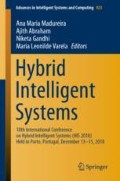Abstract
In this age where there are a lot of available data, recommender systems are a way to filter the useful information. A recommender system’s purpose is to recommend relevant items to users, and to do that, it requires information on both, data from users and from items, to better organize and categorize both of them.
There are several types of recommenders each best suited for a specific purpose, and with specific weaknesses. Then there are hybrid recommenders, made by combining one or more types of recommenders in a way that each type suppresses or at least limits the weaknesses of the other types. A very important weakness of recommender systems occurs when the system doesn’t have enough information about something and so, it cannot make a recommendation. This problem known as a Cold Start problem is addressed in this study.
There are two types of Cold Start problems: those where the lack of information comes from a user (User Cold Start) and those where it comes from an item (Item Cold Start). This article’s main focus is on User Cold Start problems. A novel approach is introduced that combines clients’ segmentation with association rules. Although the proposed solution’s average precision is similar to other main Cold Start algorithms it is a simpler approach to most of them.
Access this chapter
Tax calculation will be finalised at checkout
Purchases are for personal use only
References
Park, D.H., Kim, H.K., Choi, I.Y., Kim, J.K.: A literature review and classification of recommender systems research. Expert Syst. Appl. 39(11), 10059–10072 (2012). https://doi.org/10.1016/j.eswa.2012.02.038
Shambour, Q., Lu, J.: An effective recommender system by unifying user and item trust information for B2B applications. J. Comput. Syst. Sci. 81(7), 1110–1126 (2015). https://doi.org/10.1016/j.jcss.2014.12.029
Wu, D., Zhang, G., Lu, J.: A fuzzy preference tree-based recommender system for personalized business-to-business e-services. IEEE Trans. Fuzzy Syst. 23(1), 29–43 (2015). https://doi.org/10.1109/TFUZZ.2014.2315655
Gupta, P., Goel, A., Lin, J., Sharma, A., Wang, D., Zadeh, R.B.: WTF: the who-to-follow system at twitter. In: Proceedings of the 22nd International Conference on World Wide Web
Adomavicius, G., Tuzhilin, A.: Toward the next generation of recommender systems: a survey of the state-of-the-art and possible extensions. IEEE Trans. Knowl. Data Eng. 17(6), 734–749 (2005)
Lu, J., Wu, D., Mao, M., Wang, W., Zhang, G.: Recommender system application developments: a survey. Decis. Support Syst. 74, 12–32 (2015). https://doi.org/10.1016/j.dss.2015.03.008
Hartigan, J.: A Clustering Algorithms. Wiley, New York (1975)
Jain, A.K.: Data clustering: 50 years beyond K-means. Pattern Recogn. Lett. 31(8), 651–666 (2010)
Agrawal, R., Imielinski, T., Swami, A.N.: Mining association rules between sets of items in large databases. In: Proceedings of the 1993 ACM SIGMOD International Conference on Management of Data, pp. 207–216 (1993)
Otebolaku, A.M., Andrade, M.T.: Context-aware personalization using neighborhood-based context similarity. Wirel. Pers. Commun. 94(3), 1595–1618 (2017). https://doi.org/10.1007/s11277-016-3701-2
Yanxiang, L., Deke, G., Fei, C., Honghui, C.: User-based clustering with top-n recommendation on cold-start problem (2013). https://doi.org/10.1109/ISDEA.2012.381
Bobadilla, J., Ortega, F., Hernando, A., Bernal, J.: A collaborative filtering approach to mitigate the new user cold start problem. Knowl. Based Syst. - KBS 26, 225–238 (2011). https://doi.org/10.1016/j.knosys.2011.07.021
Kaufman, L., Rousseeuw, P.J.: Finding Groups in Data: An Introduction to Cluster Analysis. Wiley, New York (1990)
Charrad, M., Ghazzali, N., Boiteau, V., Niknafs, A.: NbClust: an R package for determining the relevant number of clusters in a data set. J. Stat. Softw. 61, 1–36 (2014)
Author information
Authors and Affiliations
Corresponding author
Editor information
Editors and Affiliations
Rights and permissions
Copyright information
© 2020 Springer Nature Switzerland AG
About this paper
Cite this paper
de Carvalho, L.C., Rodrigues, F., Oliveira, P. (2020). A Hybrid Recommendation Algorithm to Address the Cold Start Problem. In: Madureira, A., Abraham, A., Gandhi, N., Varela, M. (eds) Hybrid Intelligent Systems. HIS 2018. Advances in Intelligent Systems and Computing, vol 923. Springer, Cham. https://doi.org/10.1007/978-3-030-14347-3_25
Download citation
DOI: https://doi.org/10.1007/978-3-030-14347-3_25
Published:
Publisher Name: Springer, Cham
Print ISBN: 978-3-030-14346-6
Online ISBN: 978-3-030-14347-3
eBook Packages: Intelligent Technologies and RoboticsIntelligent Technologies and Robotics (R0)

